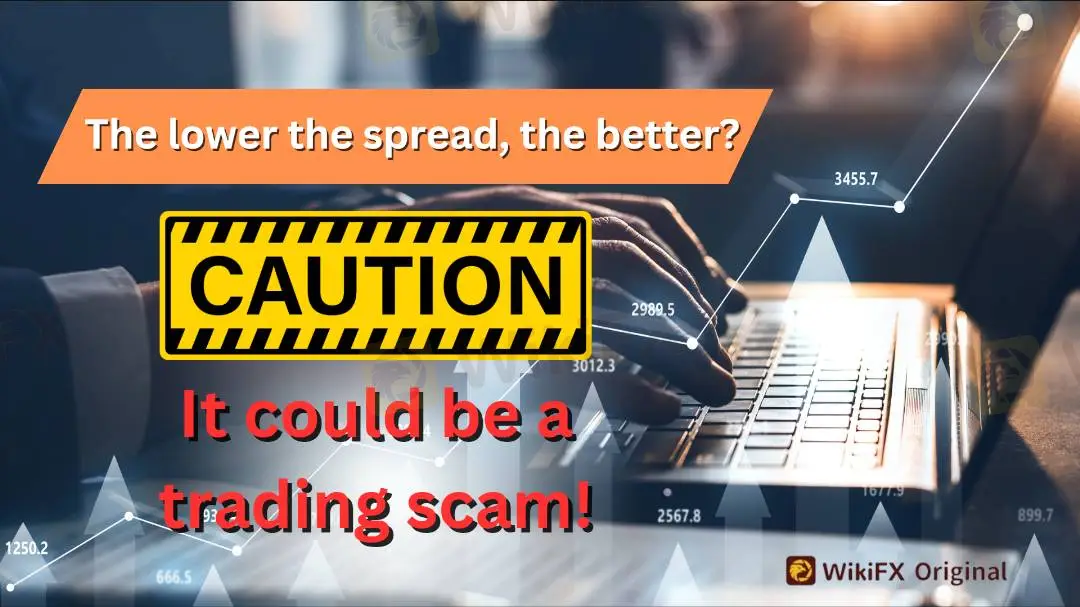简体中文
繁體中文
English
Pусский
日本語
ภาษาไทย
Tiếng Việt
Bahasa Indonesia
Español
हिन्दी
Filippiiniläinen
Français
Deutsch
Português
Türkçe
한국어
العربية
The lower the spread, the better? Be cautious, it could be a trading scam!
Abstract:As part of investment trading, spreads not only serve as a source of income for brokers but also affect the profitability of investors. For investors, it is generally preferred to have lower spreads. However, reality can be cruel, as platforms promising ultra-low spreads or even zero spreads may be gimmicks used by some unscrupulous trading platforms. Today, WikiFX will discuss the hidden secrets behind such practices.
As part of investment trading, spreads not only serve as a source of income for brokers but also affect the profitability of investors. For investors, it is generally preferred to have lower spreads. However, reality can be cruel, as platforms promising ultra-low spreads or even zero spreads may be gimmicks used by some unscrupulous trading platforms. Today, WikiFX will discuss the hidden secrets behind such practices.

Platforms with low spreads are more likely to attract investors' favor.
For those who are less familiar with investment, they may not be aware of the concept of spreads. Simply put, spreads refer to the difference between the market price and the actual transaction price.
To illustrate, let's consider a scenario where a bank sells an investment product for 1 million dollar and the broker charges a spread of 10,000 dollar. In this case, the actual transaction price becomes 990,000 dollars. On the other hand, when an investor buys the product, the broker adds 10,000 dollars to the base price of 1 million yuan, resulting in an actual transaction price of 1.01 million dollars. This difference in price between the seller and the buyer is what we call spreads.
Therefore, most investors tend to favor platforms with low spreads in order to save costs and maximize their profits.
Promoting low spreads conceals the tactics of fraudulent platforms.
In the investment market, we often come across promises of low spreads, but the reality is often far from what people expect. Take forex trading as an example, low spreads do not necessarily equate to low costs and high returns. Instead, what you may encounter are black platforms where the result is potential loss and the inability to withdraw funds.
Generally, these fraudulent platforms exploit investors' tendency to seek cheap deals. They attract attention by advertising low spreads, sometimes even claiming zero spreads. However, these promises are nothing more than bait to lure investors. Once investors deposit their funds, they fall into a trap.
The tactics employed by these fraudulent platforms are not particularly sophisticated, and experienced investors can easily see through them. Some investors fall into the trap not because they lack intelligence, but because they are lured by these temptations and are willing to take risks.
Self-discipline is the best defense against fraudulent platforms.

The primary reason many investors fall into the traps of fraudulent platforms and suffer significant losses in their investment journey is due to their excessive greed. This mindset directly leads to improper trading practices and a disregard for the dangers posed by fraudulent platforms.
Unfortunately, fraudulent platforms are prevalent in the investment market. As investors, we cannot change the industry environment. The only thing we can do is ensure that we are not deceived by these “small gains” and protect ourselves from fraudulent platform schemes. Ultimately, preventing fraud requires investors to exercise self-discipline and caution.
Investment carries risks, and careful consideration is crucial in making choices. The primary goal of investors is to achieve profitability. To avoid significant losses and falling into the traps of fraudulent platforms, it is advised to select reputable brokers. It is important not to trust false claims made by fraudulent platforms, such as extremely low spreads, and to refrain from taking risky actions when it is known that the platform operates in an irregular manner.
If you wish to assess the qualifications of a trading platform, such as whether it is an official channel, the regulatory licenses it holds, the credentials of the company itself, and its reputation, you can conduct a search on WikiFX.

Disclaimer:
The views in this article only represent the author's personal views, and do not constitute investment advice on this platform. This platform does not guarantee the accuracy, completeness and timeliness of the information in the article, and will not be liable for any loss caused by the use of or reliance on the information in the article.
Read more

The Most Effective Technical Indicators for Forex Trading
Master Forex trading with the most effective technical indicators like RSI, MACD, and Bollinger Bands to spot trends and boost profits in 2025.

Decade-Long FX Scheme Unravels: Victims Lose Over RM48 Mil
A sophisticated forex investment scheme that took a decade to establish has been exposed as a global financial fraud. In Malaysia alone, at least 77 individuals have reportedly lost more than RM48 million.

The Top 5 Hidden Dangers of AI in Forex and Crypto Trading
Discover the top 5 hidden dangers of AI in forex and crypto trading: over-reliance, market manipulation, predictive failures, ethical issues, and volatility risks.

Pepperstone Adds 79 Stocks to 24-Hour US Share CFDs
Pepperstone expands 24-hour US share CFDs, adding 79 stocks like Tesla and Nvidia, meeting demand for after-hours trading opportunities.
WikiFX Broker
Latest News
Brazilian Man Charged in $290 Million Crypto Ponzi Scheme Affecting 126,000 Investors
Become a Full-Time FX Trader in 6 Simple Steps
ATFX Enhances Trading Platform with BlackArrow Integration
Decade-Long FX Scheme Unravels: Victims Lose Over RM48 Mil
The Top 5 Hidden Dangers of AI in Forex and Crypto Trading
How to Find the Perfect Broker for Your Trading Journey?
5 Steps to Empower Investors' Trading
The Most Effective Technical Indicators for Forex Trading
IG 2025 Most Comprehensive Review
SEC Drops Coinbase Lawsuit, Signals Crypto Policy Shift
Currency Calculator






